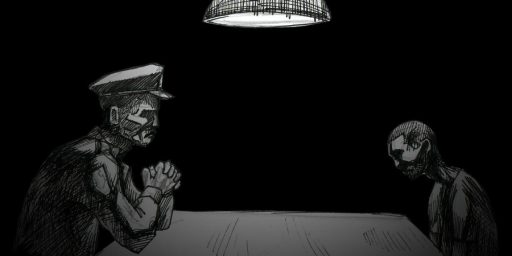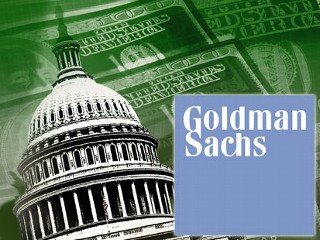TARP Paradox
If the Bush TARP initiative saved the economy at no cost to taxpayers, we have the odd situation of Republicans nonetheless angry it happened and Democrats who thought it a good idea annoyed that it worked.
TigerHawk observes,
In news that will irritate Democrats and Tea Partiers alike, it is increasingly likely that the Bush administration’s primary contribution to stabilizing the financial crisis — the Trouble Asset Relief Program, or “TARP” — will in the end cost a tiny fraction of original estimates and may well turn a profit for the federal government. If the total tab is indeed less than $50 billion, it compares quite favorably to the $125 billion spent on the S&L crisis in the early ’90s. Obviously, that does not dispose of the moral hazards and other long-term consequences of any “bailout,” but it does make it much more difficult to attack the program on utilitarian grounds.
I was exceedingly torn on the issue at the time, mostly on account of the “moral hazards and other long-term consequences,” but left unsure because of the seemingly universal sentiment among economist types that the financial sector would collapse if it wasn’t undertaken. Ultimately, I opposed it, not only because it encouraged bad behavior — indeed, rewarded those who had engaged in it while punishing those who foolishly acted prudently — but because it gave far, far too much power to unelected appointees like Henry Paulson. When they promptly ignored the law and decided to dole out money to do things other than buy up troubled assets, I felt vindicated on that score.
Regardless, I’m amused by TH commmenter Foxfier, who observes: “The folks who think the idea is great but loath those who did it are going to be annoyed it worked, and those who oppose it on principal are annoyed it happened, no matter the result!” That would be true if people understood that TARP was a Bush initiative. But the polling clearly shows that almost everyone now believe all of “the bailouts” were done under Obama.







I think it’s wrong to let politicians, or commentators, break out TARP in isolation. TARP was not at all in isolation. As I mentioned in another post, at the same time the government was aiding banks through TARP loans it was also buying a trillion dollars worth of bad mortgage backed securities off the banks. And making free cash available at the discount window. And doing a first round of quantitative easing. That’s just off the top of my head.
If we indeed verge on QE2, it will not be totally disconnected from TARP either. (That was a joke, it is fully connected, still trying to stimulate the economy in the aftermath of the credit crash.)
BTW, the reason the man in the street has trouble with TARP as a Bush initiative is that he is really using TARP as shorthand for “all of the above,” all those injections of monies into the economy.
You were wrong Jim about TARP, it was essential to restoring confidence which was in a state of collapse in the fall of 2008. You’re also wrong to fault the Treasury for the flexibility they demonstrated in its application. You need to think of the crisis as rather like one of those California wildfires where flames can erupt anywhere and apply the retardant (TARP) appropriately. It would be rather stupid to say “this firefighting material was not intended for that side of the street” so we mustn’t used it to aid the car industry or prop up AIG. I actually think this was the Bush admin’s finest hour (not that Bush had much to do with it). After displaying fairly consistent stupidity for eight years when the financial crisis struck they turned on a dime from their ideological free market beliefs and embraced the need for full blooded Keynesian remedies. They tried to apply your “moral hazard” theories to Lehman Brothers and it was their collapse that created the panic. The same was true of Bernanke who was of the same free market philosophy but was extremely creative in using the Fed’s powers to support Treasury actions. What’s most amazing about this whole saga is that in the year June 2008 to June 2009 we and the world only just dodged a huge bullet (no thanks to the Neanderthals in the GOP) which could have brought the entire financial system crashing down but somehow the Neanderthals aided by the media and some left wing idiots have created the impression amongst La Populace that it was failure. In fact it was huge success as is attested to by the strength of the banks, the revival of markets and the recovering auto industry.
I found more on what I was saying:
Two Years Since TARP – $7.8 Trillion Remaining Pillage Leftovers
Call me old fashioned, but $7.8 trillion seems like a lot.
Why would Democrats be “irritated” by this?
I guess Rick, that if you pretend that TARP (in isolation) saved us (at low cost), then Bush saved us. Horrors.
No one disputes that TARP was but a tiny part of the entire range of govt and Fed actions taken to deal with the crisis but that doesn’t reduce it significance because it was the most visible part and all the other stuff happened below the radar and isn’t understood by most people anyway. Had it it failed to pass (on the second attempt) there’s no question it would have greatly added to the sense of crisis because it would have conveyed the impression (rightly or wrongly) that the administration had lost control of the situation. Hence, after a come to Jesus conversation, some of the Neanderthals came into line and voted for it. Since then it’s become just shorthand for everything the Bush and Obama admins did to deal with the crisis.
Speaking of links to Barry Ritholz’s blog he had this very funny limerick (along with several others) up the other day.
Austrian Angst
****************
The Austrian School is at pains
To hinder that stimulus reigns,
But to make matters worse
They’re bested in verse,
For much less rhymes with Hayek than Keynes.
I find the angst of doctrinaire ideologues of all sides to be mildly amusing, of the type that one used to poke fun at Soviet ideologists. But Deng Xiaoping had it right when he said “who cares what color is a cat, only that it catches mice.”
Well, the money actually never makes it back to the official treasury. Instead it is quickly diverted to other unsanctioned uses for a variety of dubious projects by this administration. That is not to say it wouldn’t have been diverted to a different set of dubious projects by the previous administration. Essentially, while perhaps the funds were needed to cover the bad bet of the financial titans (temporarily?), the scheme was really just a big money laundering scheme taking appropriated funds, washing them through the banks then using them for uses not authorized by lawful appropriation procedures.
What’s not to like about money laundering, except if it is your cash being washed out your hands to be mined from the stream by others.
> Instead it is quickly diverted to other unsanctioned uses for a variety of dubious projects by this administration.
Perhaps you could document this. With something other than links to right wing conspiracy theory sites….
JKB says:
Sunday, October 3, 2010 at 12:16
“Well, the money actually never makes it back to the official treasury.”
Except that it has. That’s the whole point. Or didn’t you read the diary?
“The folks who think the idea is great but loath those who did it are going to be annoyed it worked…”
Oddly enough though, I really haven’t met or heard of anyone who displays this annoyance. Well, maybe its not so odd. I, for one, am glad it worked, and in fact my general discomfort at being absolutist is assuaged by being able to point out one thing that the Bush administration did right (OK, anti-AIDS funding in Africa – that makes two!).
I think Tano’s right. I haven’t really seen or heard any liberals complaining. After all, it validates our belief in occasional government intervention and puts the lie to right wing hysteria over this.
Imagine the pain on the right if GM has a successful IPO.
I am perfectly happy to give the Bush admin credit for good crisis mangement. TARP worked.
“I guess Rick, that if you pretend that TARP (in isolation) saved us (at low cost), then Bush saved us. Horrors.”
I get that, John, and thanks for the reply…but if memory serves, TARP was passed with mostly Democratic votes. Seems weird to me that they’d now be irritated by a policy they supported.
Maybe that’s why I’m not a conservative blogger.
Anjin, something needed to be done, and Bush-Paulson did something. There aren’t many who would call the result good crisis management. Not genuinely good anyway.
I guess if we are big enough cynics we might call it as good as our society was going to do.
That leads to the question of in which sense James (and others) “opposed” it. Did they oppose it in the sense that doing nothing was a better choice? Or only in the weak sense that a better (but politically impossible) choice was set as an ideal?
To me it’s an open question how much better our society could have done. We aren’t a bunch of level-headed Scandinavians.
“There aren’t many who would call the result good crisis management. Not genuinely good anyway.”
This depends on how you define “good.” It worked and that’s the ultimate criteria.
“Worked” implies it is over. To believe that, we need to believe it worked in isolation, and that there are no ongoing programs or effects.
Read “Confidence Game” for an interesting perspective: http://cunningrealist.blogspot.com/
michael reynolds says:
Sunday, October 3, 2010 at 12:52
“Imagine the pain on the right if GM has a successful IPO.”
But Michael you don’t understand. GM was only saved because Obama personally refused to pay out 100 cents on the dollar to speculating bond holders. After all their interests were much more important than saving the US auto industry.
I got back on the computer (iphone before) to get this link and graph showing the fed balance sheet:
http://blogs.wsj.com/economics/2010/06/15/a-look-inside-the-feds-balance-sheet-2/tab/interactive/
Still very much in disaster mode, I think.
“Still very much in disaster mode, I think.”
It would hardly be sensible to start unwinding all these positions at the moment (particularly if you think the economy is on the edge of a double dip recession). In fact if they proceed with quantitive easing, this balance sheet will grow.
> “Worked” implies it is over.
It implies nothing. It means we avoided a depression, which is where a cascade failure in the banking system may well have taken us. We were a lot closer to the edge than most people seem to realize.
anjin-san says:
Sunday, October 3, 2010 at 16:30
> “Worked” implies it is over.
“It implies nothing. It means we avoided a depression,”
No it doesn’t imply it’s all over. It implies it was intended to avoid a slipping into depression. We didn’t, as you confirm. Hence “it worked” achieved its goal. And as my comments above indicate I’m well aware we were looking into an abyss.
Is this thread centered on the pseudo-completion of TARP, with an avoidance of the other 19.4 trillion, or is it not?
Do people saying “TARP worked” fully encorporate that it was something like 3% “of the federal bank bailout and subsidization plan” into their worldview?
That is why I question “worked.”
Anjin-san, do you have empirical evidence “we were looking into an abyss?”
I recommend this, Pete:
The Giant Pool of Money
(If I’m remembering correctly, that’s the show where they talk to people who were there when overnight funds dried up, and money markets broke the buck. That was the abyss that sent Paulson down on one knee before Nancy Pelosi.)
> “we were looking into an abyss?”
Where did i use those words?
The smartest money people I know convince me that we were pretty close to the brink in sept ’08. Its kind of hard to prove either way. WAMU was starting to experience runs. I believe decisive government action restored enough confidence in the banking system to end trend towards bank runs. If we had gone down that road, I think the wheels would have come off.
Pete: Do you have empirical evidence that we were not within shouting distance of the edge?
Huh. I seem to be in the middle here. I think there was an abyss. Action was required. The actions taken were possibly the best we could do, given who we are, but they were nonetheless sub-optimal. It has led to some degree of looting.
Remember when Republicans thought management of failed and bailed institutions should get their bonuses? Looting.
The Financial Times has an article “How an unloved bail-out saved America” – google search that title for an unlocked copy.
Pete has gone missing…